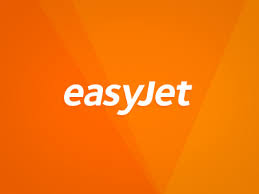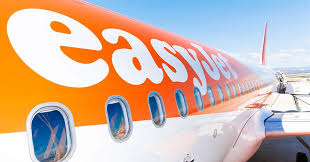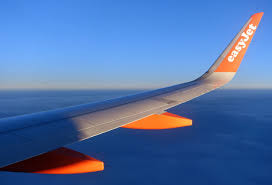Introduction: Revolution in the Skies
In the mid-1990s, when air travel was still seen as a luxury, a new player entered the European market with a bold vision: to make flying as affordable and easy as catching a bus. That company was EasyJet, a British low-cost carrier that redefined how millions travel across Europe. With its signature bright orange branding, stripped-back service model, and efficient operations, EasyJet became one of the most influential airlines in modern aviation history.

1. The Birth of EasyJet
Humble Beginnings
EasyJet was founded in 1995 by Sir Stelios Haji-Ioannou, a Greek-Cypriot entrepreneur with a disruptive mindset. Backed by his family’s shipping fortune, Stelios launched EasyJet with a simple motto: “making flying as affordable as a pair of jeans.“
The airline began operations with two leased Boeing 737-200 aircraft flying between London Luton and Glasgow/Edinburgh. Tickets were sold directly over the phone, eliminating travel agents and cutting costs. The low prices – starting from £29 – were unheard of at the time.
Early Challenges and Breakthroughs
Though initially met with skepticism, EasyJet quickly gained momentum. By 2000, it had gone public on the London Stock Exchange, using capital to expand its fleet and network. The rise of online booking in the early 2000s played a major role in EasyJet’s growth. The brand fully embraced the internet, making it one of the first airlines to push direct-to-consumer digital sales.
2. Business Model and Strategy
Low-Cost, No-Frills Philosophy
EasyJet pioneered the low-cost carrier (LCC) model in Europe alongside Ryanair. The strategy was simple but effective:
- Use of secondary airports to save on landing fees
- High aircraft utilization (quick turnarounds of under 30 minutes)
- Point-to-point routes rather than hub-and-spoke models
- No complimentary services (meals, checked luggage, seat selection are extra)
- Single aircraft type (mostly Airbus A320 family) to reduce maintenance and training costs
Fleet and Network
As of 2024, EasyJet operates a fleet of over 300 aircraft, mostly Airbus A319s, A320s, and A321neos. Its expansive network covers over 150 destinations across more than 30 countries, with major bases at:
3. The EasyGroup Ecosystem
EasyJet is part of the broader EasyGroup, a family of brands founded by Stelios that all follow a low-cost ethos. These include:
- EasyHotel – budget accommodations
- EasyCar – car rental services
- EasyBus – affordable coach travel
- EasyGym – no-frills gyms
While not all EasyGroup ventures succeeded, they contributed to the recognizable “Easy” brand identity – simple, functional, and affordable.

4. Technological Innovations
EasyJet has always leaned into technology to drive efficiency and improve the customer experience:
Digital Check-in and Boarding
EasyJet was one of the first in Europe to:
- Offer mobile boarding passes
- Enable real-time flight tracking
- Allow biometric boarding trials
Fuel Efficiency and Sustainable Tech
EasyJet has taken active steps toward reducing its carbon footprint, including:
- Modernizing its fleet with fuel-efficient Airbus A320neo and A321neo aircraft
- Investing in electric aircraft technology via partnerships with companies like Wright Electric
- Implementing carbon offsetting (though critics debate its impact)
5. EasyJet Holidays: A One-Stop Travel Solution
In recent years, EasyJet has expanded into the holiday package business with EasyJet Holidays. This service combines:
- Flights
- Hotel stays
- Transfers
- Add-ons (meals, insurance)
6. EasyJet Holidays: A Deeper Dive into Affordable Getaways
EasyJet Holidays is more than just a flight and hotel bundling service—it’s a comprehensive travel solution designed to take the stress and guesswork out of holiday planning. Launched as a dedicated brand in 2019, EasyJet Holidays has grown rapidly, now offering thousands of ATOL-protected packages to some of Europe’s most loved destinations.
Why EasyJet Holidays Stands Out
Unlike traditional holiday providers, EasyJet Holidays leverages the airline’s extensive flight network, allowing for high flexibility and affordability. Customers can:
- Choose from over 100 beach and city destinations
- Customize travel dates (not limited to 7 or 14-night stays)
- Select from 3-star to 5-star hotel options
- Book last-minute trips or plan months in advance
- Access inclusive options like half-board, all-inclusive, or room-only stays
This à la carte approach appeals to modern, independent travelers who want choice, value, and convenience.
Popular Holiday Destinations
Some of the top destinations available through EasyJet Holidays include:
- Spain: Costa del Sol, Mallorca, Tenerife
- Greece: Crete, Santorini, Corfu
- Portugal: Algarve, Lisbon
- Turkey: Antalya, Dalaman
- Italy: Rome, Venice, Amalfi Coast
- Croatia: Dubrovnik, Split
The airline curates packages with hand-picked hotels that match different tastes—from family-friendly resorts to adults-only beach escapes and boutique city breaks.

Holidays for Every Type of Traveller
EasyJet Holidays has diversified its offerings to cater to niche segments, including:
- Family Holidays: Hotels with kids’ clubs, pools, and short transfers
- Couples’ Retreats: Romantic escapes with spa amenities
- Luxury Breaks: 5-star resorts with premium inclusions
- Sustainable Stays: Eco-conscious hotels that reduce carbon impact
- City Escapes: Culture-rich, centrally located hotels for weekend getaways
Each booking includes 23kg checked luggage per passenger, hotel transfers for beach holidays, and ATOL protection, giving customers both value and peace of mind.
Flexible Booking and Cancellation
One of the standout features is EasyJet Holidays’ flexibility promise:
- Low deposits starting from £60 per person
- Fee-free changes up to 28 days before departure
- Refund guarantee if plans change
- Option to pay in monthly installments
This flexible approach was particularly welcomed after the COVID-19 travel disruption and continues to be a major selling point.
EasyJet Holidays App and Customer Experience
In 2023, EasyJet Holidays integrated deeply with the EasyJet mobile app, allowing customers to:
- Manage holidays from their phone
- Access booking documents, itineraries, and updates
- Explore destination guides and travel tips
- Receive real-time flight and hotel updates
This seamless digital experience helps position EasyJet Holidays as a tech-savvy, user-friendly holiday provider.
7. EasyJet Holidays: Strategic Importance for the Brand
While EasyJet’s core airline business remains vital, EasyJet Holidays plays an increasingly profitable and stabilizing role in the company’s overall strategy.
Revenue Diversification
Offering holidays allows EasyJet to diversify revenue streams and gain higher profit margins compared to seat-only sales. In fact, holiday packages often outperform airline seats in terms of revenue per customer.
Strengthening Off-Peak Demand
By promoting holidays during non-peak months, EasyJet fills seats that might otherwise go unsold—particularly to sun destinations in shoulder seasons.
Competing with Full-Service Operators
8. Sustainability Commitments
As environmental concerns grow, EasyJet has been actively pushing for greener aviation. Its roadmap includes:
- Net-zero emissions by 2050
- Investing in hydrogen-powered aircraft research
- Partnering with Rolls-Royce and Airbus ZeroE
- Reducing onboard plastic and waste
Despite these efforts, EasyJet – like all airlines – faces criticism for contributing to climate change. However, among low-cost airlines, it is seen as one of the most proactive in sustainability.

9. EasyJet’s Brand Identity
Logo and Colors
EasyJet’s orange and white branding is instantly recognizable. It communicates:
- Simplicity
- Energy
- Affordability
Advertising and Slogans
Past campaigns include:
- “Come on, let’s fly”
- “This is Generation EasyJet”
- “Europe by EasyJet”
EasyJet ads typically highlight ease of travel, low fares, and travel inspiration.
10. Customer Experience and Loyalty
EasyJet offers a tiered experience depending on what travelers want to pay for:
- Basic: low fare, no extras
- Standard Plus: includes seat selection and fast-track
- Flexi: for business travelers, offering flexibility
It also runs a loyalty program called “EasyJet Plus”, offering perks like:
- Dedicated check-in
- Speedy boarding
- Seat selection
The airline has invested in mobile apps, chatbots, and AI-based pricing tools to enhance the user experience.

11. Corporate Responsibility and Employment
Workforce and Diversity
EasyJet employs around 13,000 people, including pilots, cabin crew, and engineers. The airline has been a leader in promoting gender diversity, with initiatives aimed at increasing the number of female pilots.
Community Engagement
EasyJet supports education, STEM careers, and local charities, especially around its airport hubs.
12. Challenges and Controversies
No airline is without its hurdles. EasyJet has faced:
- Flight delays and cancellations
- Brexit-related issues around airline ownership and regulations
- Crew strikes in several European countries
- Technical glitches in booking systems
However, the brand has largely maintained customer trust through transparent communication and reliable core service.
13. Looking Ahead: The Future of EasyJet
EasyJet is positioning itself for a future marked by:
- Sustainable growth
- Technological advancement
- Flexible travel models
Its focus remains on offering low fares while pushing for greener, smarter flying. Whether it’s short-haul city breaks or sun-drenched holiday escapes, EasyJet wants to remain Europe’s airline of choice.
Conclusion: From Budget Start-Up to Aviation Icon
EasyJet’s journey from a two-plane operation to one of Europe’s largest airlines is a story of vision, adaptability, and relentless innovation. In a world where affordability and sustainability increasingly define travel, EasyJet continues to evolve — proving that low cost doesn’t have to mean low quality.
From families heading to sunny beaches to professionals jetting off for a quick meeting, EasyJet has made air travel accessible to all — and in doing so, has carved its place in aviation history.
